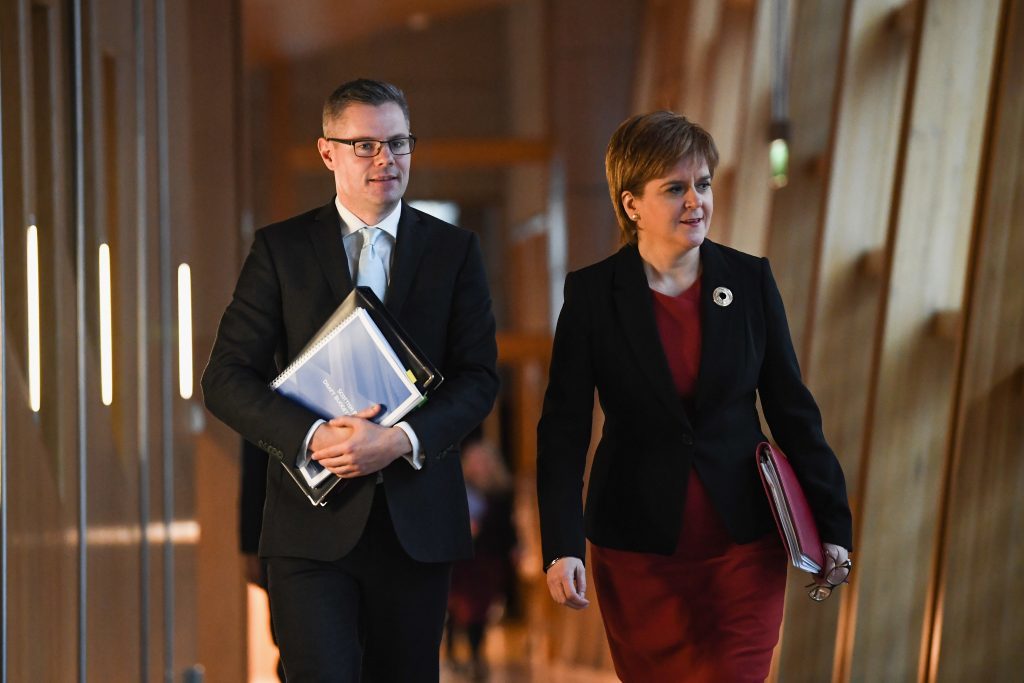
Scotland’s Finance Secretary unveiled his draft Budget to Holyrood.
Derek Mackay gave a statement to MSPs, detailing the Scottish Government’s draft tax and spending plans for 2018-19.
At the start of his statement Mr Mackay stressed the financial challenges that will arise from both Brexit and the declining number of Scots of working age.
To address this he pledged the Scottish Govenrment would “continue to make the case for a common sense solution to Brexit that keeps Scotland and the UK in the single market and customs union.”
Mr Mackay announced plans to increase the Economy, Jobs and Fair Work portfolio funding by £270 million, 64%.
He said the increased investment contributes to almost £2.4 billion for enterprise and skills agencies, and includes a 70% increase in funding for business research and investment to £37 million.
The plan also doubles the funding to City Region Deals to £122 million.
Around £1.8 billion will be invested in colleges and universities, representing a real terms increase in their funding.
An initial £18 million has been allocated for the new manufacturing institute announced by Ms Sturgeon on Monday.
A further £60 million will go to a low carbon innovation fund to support the transition to a low carbon economy, with £1.2 billion to be invested in transport infrastructure and £20 million for electric vehicles.
A total of £4 billion will be invested in infrastructure spending in Scotland – with the Finance Secretary saying this was part of £20 billion of spending over the lifetime of the parliament.
And he said this included the “first steps toward one of the most significant infrastructure projects of this Parliament – superfast broadband for the whole of Scotland”.
This commitment is “unmatched anywhere in the UK”, he said.
Mr Mackay said the government would accept the recommendations of the Barclay Review on business rates in full, except those on removing charity relief from universities and Arm’s Length External Organisations (ALEOs).
The Attainment Scotland Fund, which works to reduce educational inequality in Scotland, is being increased £179 million in 2018-19.
Of this, £120 million will go to headteachers to decide how to spend under the Pupil Equity Fund.
Mr Mackay also pledged £59 million to “provided targeted support for children and young people in greatest need”, with £10 million for youngsters with complex additional support needed.
He said: “In the coming year the government will invest almost a quarter of a billion pounds to build more nurseries, support childcare professionals, create jobs and graduate opportunities and provide support for parents.”
In 2018-19 £243 million will be allocated for expanding the Scottish Government’s free childcare scheme.
The Finance Secretary said £756 million would be invested in 2018-19 as part of a commitment to deliver 50,000 affordable homes over the five years of the Parliament.
He also announced first time buyers will not pay Land and Building Transaction Tax on properties costing under £175,000 – taking 80% of them out of paying the tax.
Mr Mackay said the local government resource budget would be protected in cash terms with the capital budget increased in real terms “resulting in a total increase in local authority core funding of £94 million”.
The finance secretary said he had been able to avoid council concerns about a possible cut to their budgets of around £300 million.
In addition the Scottish Government will provide more than £20 million of additional investment in the police service, with £5.5 million to go on the “continued transformation” of the fire service.
A total of £110 million will be invested in the reform of primary care and cash for mental health will be boosted by £17 million.
The Budget plans to invest more than £550 million to support the integration of health and social care.
The finance secretary said health resource funding would be increased by more than £400 million in 2018-19, “taking our total frontline investment to over £13 billion in the coming year”.
Income tax in Scotland is being increased to 21p for those earning over £24,000 a year.

Enjoy the convenience of having The Sunday Post delivered as a digital ePaper straight to your smartphone, tablet or computer.
Subscribe for only £5.49 a month and enjoy all the benefits of the printed paper as a digital replica.
Subscribe